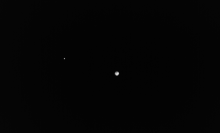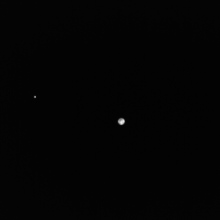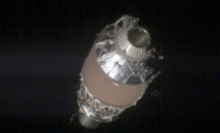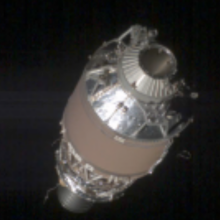A mini moon that will bid farewell to Earth soon may in fact be a small hunk of the big moon — the one that has loomed far longer in the sky than humans have roamed the planet.
A follow-up study has taken a closer look at the bus-sized space rock to better understand what it's made of, how fast it's spinning, and where it's traveling. A team of researchers says the mini moon is something in between an S-type asteroid, made of silicates and metal, and a V-type like Vesta, the second-largest object in the main asteroid belt.
Though the results were not conclusive, they suggest the mini moon, officially referred to as 2024 PT5, has a lunar origin, closely matching powder collected by the Soviet Union's robotic Luna 24 mission in 1976, followed by samples from NASA's Apollo 12 mission in 1969. Both of those specimens came from maria, dark shadowy-looking lunar regions of ancient hardened lava flows.
The paper, whose authors include the two astronomers who discovered the mini moon in August, proposes that 2024 PT5 may have emerged from craters formed during the past 1 million years or so. The manuscript is under peer review for publication in Astronomy & Astrophysics Letters.

Asteroid 2024 PT5, which is making a complete spin every hour, has flown partially around Earth since Sept. 29 and will make its departure on Nov. 25, according to the manuscript. Since its arrival, the visitor has caused a nerd maelstrom, with many people arguing that calling such a small, Johnny-come-lately rock a moon is a misnomer. Even celebrity space communicator Neil deGrasse Tyson weighed in on the controversy, calling the mini-moon label "click bait."
Despite that debate, Carlos de la Fuente Marcos, one of the discoverers based at the Universidad Complutense de Madrid in Spain, is comfortable with the term, citing literature to support its usage in his papers.
"What we have here is a typical example of using different scientific criteria," he told Mashable. "It is a temporarily captured satellite of Earth, call it a mini moon if you like."
What is clear is that asteroids are influenced by Earth's gravity in this way fairly often, and the vast majority fly by without completing a full trip. Most are suspected to come from the so-called Arjuna asteroid belt, a group of rocks concentrated near Earth that was discovered in the early 1990s.
These asteroids complete one revolution around the sun every year, and the Earth and moon actually travel through the middle of that belt, de la Fuente Marcos said. In fact, rock captures from the group may be so probable that this specific object may become a mini moon again in the future.
But compared to mini moons of the recent past, 2024 PT5 is a short-timer. In July 2006, a visitor dubbed RH120 stayed in orbit around Earth for a year before getting flung out in July 2007. Astronomers believe one that left in May 2020 could have been sweeping around the planet for several years.

Despite their frequency, mini-moon episodes should not be scoffed at as ordinary, said Antonio Maudes, CEO of Light Bridges, which manages several robotic telescopes in Spain's Canary Islands. His company's Two-meter Twin Telescope provided observational data for the research team.
"You will probably not find more interesting objects than these ones in the solar system because they are so close to Earth, and they will come back," he told Mashable. "That's cool."
The company is developing a project in Spain dedicated to monitoring cislunar space, the region around Earth and the moon. Its purpose is to increase astronomers' statistical understanding of mini moons' origins, orbits, materials, and rotational speeds. Such information is not just helpful for looking out for potentially hazardous rocks that could smash into Earth. Maudes thinks it could be useful for commercial exploits, too.
"Call it a mini moon if you like."
Venture capitalists have been buzzing for some time about a burgeoning industry of space-mining for valuable minerals. The Arjuna asteroids are much closer than those in the main asteroid belt, between Mars and Jupiter, perhaps making them more practical destinations. Adolfo Nemirovsky, a physicist and adviser to Light Bridges, likens these nearby asteroids to Home Depot — relatively convenient places for picking up materials to build moon bases and supply space missions.

Although 2024 PT5 is on its way out now, many astronomers are grateful that it opened the public's eyes to the reality that a lot of stuff is whizzing around the world all the time.
"You feel that it's an empty space between here and the moon, and there is nothing there — it's not at all like that," Maudes said. "There are a lot of different forces at play here."
NASA plans to observe 2024 PT5 with the Goldstone Solar System Radar in California in January 2025. At that point, the object will be very distant — about five times farther than the moon, roughly 239,000 miles away — before continuing on its trajectory around the sun.
Topics NASA













